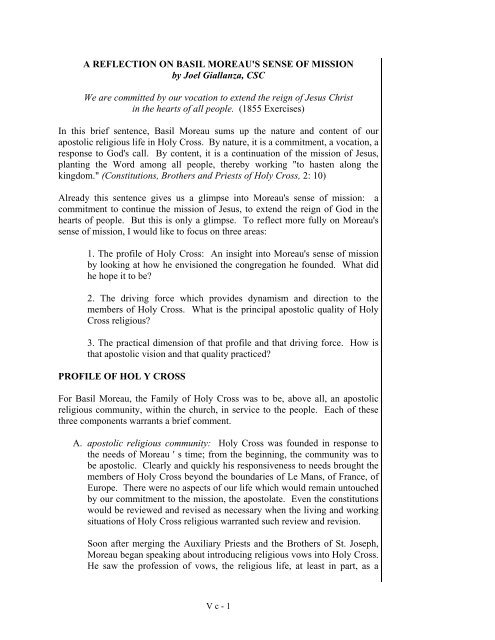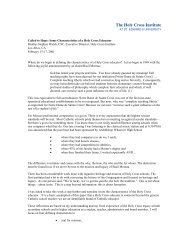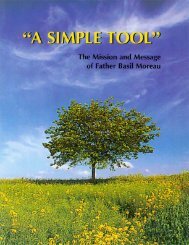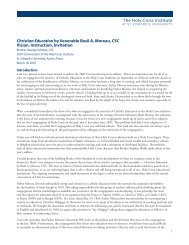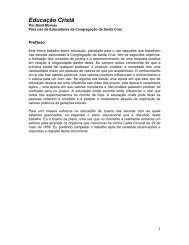A Reflection on Basil Moreau's Sense of Mission - Holy Cross Institute
A Reflection on Basil Moreau's Sense of Mission - Holy Cross Institute
A Reflection on Basil Moreau's Sense of Mission - Holy Cross Institute
Create successful ePaper yourself
Turn your PDF publications into a flip-book with our unique Google optimized e-Paper software.
A REFLECTION ON BASIL MOREAU'S SENSE OF MISSION<br />
by Joel Giallanza, CSC<br />
We are committed by our vocati<strong>on</strong> to extend the reign <strong>of</strong> Jesus Christ<br />
in the hearts <strong>of</strong> all people. (1855 Exercises)<br />
In this brief sentence, <strong>Basil</strong> Moreau sums up the nature and c<strong>on</strong>tent <strong>of</strong> our<br />
apostolic religious life in <strong>Holy</strong> <strong>Cross</strong>. By nature, it is a commitment, a vocati<strong>on</strong>, a<br />
resp<strong>on</strong>se to God's call. By c<strong>on</strong>tent, it is a c<strong>on</strong>tinuati<strong>on</strong> <strong>of</strong> the missi<strong>on</strong> <strong>of</strong> Jesus,<br />
planting the Word am<strong>on</strong>g all people, thereby working "to hasten al<strong>on</strong>g the<br />
kingdom." (C<strong>on</strong>stituti<strong>on</strong>s, Brothers and Priests <strong>of</strong> <strong>Holy</strong> <strong>Cross</strong>, 2: 10)<br />
Already this sentence gives us a glimpse into <strong>Moreau's</strong> sense <strong>of</strong> missi<strong>on</strong>: a<br />
commitment to c<strong>on</strong>tinue the missi<strong>on</strong> <strong>of</strong> Jesus, to extend the reign <strong>of</strong> God in the<br />
hearts <strong>of</strong> people. But this is <strong>on</strong>ly a glimpse. To reflect more fully <strong>on</strong> <strong>Moreau's</strong><br />
sense <strong>of</strong> missi<strong>on</strong>, I would like to focus <strong>on</strong> three areas:<br />
1. The pr<strong>of</strong>ile <strong>of</strong> <strong>Holy</strong> <strong>Cross</strong>: An insight into <strong>Moreau's</strong> sense <strong>of</strong> missi<strong>on</strong><br />
by looking at how he envisi<strong>on</strong>ed the c<strong>on</strong>gregati<strong>on</strong> he founded. What did<br />
he hope it to be?<br />
2. The driving force which provides dynamism and directi<strong>on</strong> to the<br />
members <strong>of</strong> <strong>Holy</strong> <strong>Cross</strong>. What is the principal apostolic quality <strong>of</strong> <strong>Holy</strong><br />
<strong>Cross</strong> religious?<br />
3. The practical dimensi<strong>on</strong> <strong>of</strong> that pr<strong>of</strong>ile and that driving force. How is<br />
that apostolic visi<strong>on</strong> and that quality practiced?<br />
PROFILE OF HOL Y CROSS<br />
For <strong>Basil</strong> Moreau, the Family <strong>of</strong> <strong>Holy</strong> <strong>Cross</strong> was to be, above all, an apostolic<br />
religious community, within the church, in service to the people. Each <strong>of</strong> these<br />
three comp<strong>on</strong>ents warrants a brief comment.<br />
A. apostolic religious community: <strong>Holy</strong> <strong>Cross</strong> was founded in resp<strong>on</strong>se to<br />
the needs <strong>of</strong> Moreau ' s time; from the beginning, the community was to<br />
be apostolic. Clearly and quickly his resp<strong>on</strong>siveness to needs brought the<br />
members <strong>of</strong> <strong>Holy</strong> <strong>Cross</strong> bey<strong>on</strong>d the boundaries <strong>of</strong> Le Mans, <strong>of</strong> France, <strong>of</strong><br />
Europe. There were no aspects <strong>of</strong> our life which would remain untouched<br />
by our commitment to the missi<strong>on</strong>, the apostolate. Even the c<strong>on</strong>stituti<strong>on</strong>s<br />
would be reviewed and revised as necessary when the living and working<br />
situati<strong>on</strong>s <strong>of</strong> <strong>Holy</strong> <strong>Cross</strong> religious warranted such review and revisi<strong>on</strong>.<br />
So<strong>on</strong> after merging the Auxiliary Priests and the Brothers <strong>of</strong> St. Joseph,<br />
Moreau began speaking about introducing religious vows into <strong>Holy</strong> <strong>Cross</strong>.<br />
He saw the pr<strong>of</strong>essi<strong>on</strong> <strong>of</strong> vows, the religious life, at least in part, as a<br />
V c - 1
means <strong>of</strong> stabilizing and organizing <strong>Holy</strong> <strong>Cross</strong> for the future<br />
effectiveness <strong>of</strong> its ministries. Moreau most certainly understood the<br />
sanctifying aspect <strong>of</strong> the vows and the other elements <strong>of</strong> religious life.<br />
Even the sanctificati<strong>on</strong> <strong>of</strong> the members was to be directed toward missi<strong>on</strong>.<br />
Community was a passi<strong>on</strong> for Moreau. He believed the unity am<strong>on</strong>g us<br />
was a powerful apostolic force which could have a transforming effect<br />
up<strong>on</strong> the whole world. Even in <strong>Moreau's</strong> time, <strong>Holy</strong> <strong>Cross</strong> was to be<br />
inclusive, collaborative, multi-cultural, and internati<strong>on</strong>al. Those same<br />
characteristics shape the priorities we hold for our presence and activity in<br />
ministry.<br />
B. within the church: For almost 20 years, <strong>Basil</strong> Moreau worked for papal<br />
approbati<strong>on</strong> <strong>of</strong> the c<strong>on</strong>stituti<strong>on</strong>s. Though we cannot pretend this had no<br />
political implicati<strong>on</strong>s for him and for the c<strong>on</strong>gregati<strong>on</strong>; it is important to<br />
note that even those implicati<strong>on</strong>s were apostolic. Once <strong>Holy</strong> <strong>Cross</strong> could<br />
move easily bey<strong>on</strong>d the boundaries <strong>of</strong> Le Mans, its apostolic effectiveness<br />
and prestige would <strong>on</strong>ly be enhanced. Nevertheless, it was important to<br />
Moreau that <strong>Holy</strong> <strong>Cross</strong> be a recognized part <strong>of</strong> the universal church,<br />
planted deeply within the church, moving ever with the spirit <strong>of</strong> the church<br />
in resp<strong>on</strong>ding to the needs <strong>of</strong> the people.<br />
C. in service to the people: This is self-explanatory. Apostolic sensitivity<br />
and resp<strong>on</strong>siveness were to remain focused <strong>on</strong> the needs <strong>of</strong> the people. As<br />
those needs changed, <strong>Holy</strong> <strong>Cross</strong> would need to change or become<br />
apostolically obsolete and thus ineffective. A significant means <strong>of</strong><br />
fostering that sensitivity and resp<strong>on</strong>siveness is respect for and integrati<strong>on</strong><br />
into culture. Our service to the people is also a service with the people.<br />
Our presence and activity are influenced by and resp<strong>on</strong>sive to the richness<br />
and depth <strong>of</strong> the cultures in which we live and minister.<br />
As we c<strong>on</strong>tinue the missi<strong>on</strong> <strong>of</strong> Jesus today, as we seek to change in<br />
resp<strong>on</strong>se to the needs <strong>of</strong> the people, how do we assure that we remain an<br />
apostolic religious community within the church in service to and with the<br />
people? How do we assure that we c<strong>on</strong>tinue to resp<strong>on</strong>d to present needs?<br />
DRIVING FORCE OF HOL Y CROSS<br />
The primary apostolic quality for <strong>Basil</strong> Moreau is zeal. Simply described, zeal is<br />
a hunger for missi<strong>on</strong>, a passi<strong>on</strong> to c<strong>on</strong>tinue what Jesus <strong>of</strong> Nazareth began through<br />
his life, teaching, and example.<br />
By zeal is understood that flame <strong>of</strong> burning desire which <strong>on</strong>e feels to make<br />
God known, loved and served and thus save souls. Apostolic activity is<br />
therefore the essential character <strong>of</strong> this virtue, and (ministers) who are<br />
animated by this virtue will fulfill their duties with eagerness, affecti<strong>on</strong>,<br />
V c - 2
courage and perseverance ... Our zeal is always guided by charity,<br />
everything is d<strong>on</strong>e with strength and gentleness: strength because we are<br />
courageous and unshakable in the midst <strong>of</strong> pain, difficulty and trials…and<br />
gentleness because we have the tenderness <strong>of</strong> our Divine Model.<br />
(Christian Pedagogy, I:1, art 4- 1856)<br />
By reading Moreau’s comments <strong>on</strong> zeal we can formulate a more exact<br />
descripti<strong>on</strong> <strong>of</strong> what he means by this apostolic virtue. Zeal is that power, that<br />
grace, through which the c<strong>on</strong>victi<strong>on</strong>s <strong>of</strong> our hearts are translated into the acti<strong>on</strong>s<br />
<strong>of</strong> our hands and directed toward love <strong>of</strong> others.<br />
A. c<strong>on</strong>victi<strong>on</strong>s <strong>of</strong> our hearts: Zeal begins in faith. Without faith, what can<br />
<strong>of</strong>ten be described as zeal is workaholism. If any <strong>of</strong> the energies and<br />
efforts we expend in ministry are truly to be c<strong>on</strong>tinuati<strong>on</strong>s <strong>of</strong> Jesus’<br />
missi<strong>on</strong>, then the motivati<strong>on</strong> for expending those energies and efforts must<br />
be rooted in the life and example <strong>of</strong> Jesus. Our love for the Lord and our<br />
faith in God’s Word are why we c<strong>on</strong>tinue the missi<strong>on</strong> <strong>of</strong> Jesus in resp<strong>on</strong>se<br />
to God’s call.<br />
B. translated into the acti<strong>on</strong>s <strong>of</strong> our hands: Zeal, like the faith in which it is<br />
rooted, is work. Zeal takes energy and effort; never is it a theory or a<br />
feeling about what should be d<strong>on</strong>e. Zeal is in the doing; it is, essentially,<br />
incarnati<strong>on</strong>al.<br />
C. directed toward love <strong>of</strong> others: Zeal ends in love. Without love, what can<br />
<strong>of</strong>ten be described as zeal is humanitarianism. Zeal resp<strong>on</strong>ds to the needs<br />
<strong>of</strong> others in generosity and love, it does not perpetuate areas <strong>of</strong> expertise<br />
merely for their own c<strong>on</strong>tinuati<strong>on</strong>. As needs change, we bear the<br />
resp<strong>on</strong>sibility to see that we are skilled and flexible to meet those needs.<br />
Love for the Lord and for others demands an ever-fresh pastoral<br />
competence and flexibility.<br />
So, as we strive to be genuinely zealous apostles <strong>of</strong> the Lord Jesus, how do we<br />
assure that our efforts in the missi<strong>on</strong> begin in faith, do the work that needs to be<br />
d<strong>on</strong>e, and end in love? How do we overcome any resistance within ourselves to<br />
acquiring new skills and competencies so our view <strong>of</strong> the missi<strong>on</strong> and our<br />
involvement in it do not stagnate?<br />
PUTTING HOLY CROSS INTO PRACTICE<br />
In our first papally approved c<strong>on</strong>stituti<strong>on</strong>s, Moreau outlined the "ends" — or<br />
purpose — <strong>of</strong> <strong>Holy</strong> <strong>Cross</strong>.<br />
The ends <strong>of</strong> the C<strong>on</strong>gregati<strong>on</strong> are as follows:<br />
V c - 3
1. The perfecti<strong>on</strong> <strong>of</strong> individuals by the practice <strong>of</strong> the evangelical<br />
counsels;<br />
2. The sanctificati<strong>on</strong> <strong>of</strong> others by preaching the word <strong>of</strong> God, especially<br />
in the country and foreign missi<strong>on</strong>s;<br />
3. The instructi<strong>on</strong> and educati<strong>on</strong> <strong>of</strong> youth by means <strong>of</strong> schools where<br />
letters and sciences will be taught, and agricultural and technical<br />
schools; these latter are especially for poor and aband<strong>on</strong>ed children.<br />
(1857 C<strong>on</strong>stituti<strong>on</strong>s, I)<br />
Even before that, in the Rules <strong>of</strong> 1847, we read:<br />
The aim <strong>of</strong> the C<strong>on</strong>gregati<strong>on</strong> is to work, not <strong>on</strong>ly at <strong>on</strong>e's own salvati<strong>on</strong>,<br />
but also at the sanctificati<strong>on</strong> <strong>of</strong> others by ministering to them ... (1847<br />
Rules, Part 2, Rule XI, 120)<br />
In summarizing what Father Moreau says in this and related texts, we can say<br />
religious <strong>of</strong> <strong>Holy</strong> <strong>Cross</strong> are called to holiness to call others to holiness so our<br />
work is truly the Lord' s own.<br />
A. For missi<strong>on</strong>, we are called to holiness: For <strong>Basil</strong> Moreau, the place where<br />
missi<strong>on</strong> begins is within the minister. Pers<strong>on</strong>al holiness is requisite for<br />
effective ministry. In fact, it is necessary for any ministry to be ministry;<br />
without a commitment to pers<strong>on</strong>al holiness what is called ministry<br />
becomes merely work. If we do not claim holiness to be a priority for our<br />
own lives, then it is unlikely that we can sustain any effective<br />
communicati<strong>on</strong> <strong>of</strong> the call to holiness to others. Calling others to tap the<br />
transforming grace which comes through a love-relati<strong>on</strong>ship with Jesus <strong>of</strong><br />
Nazareth assumes we have tapped and c<strong>on</strong>tinue to nurture that same grace.<br />
B. Through missi<strong>on</strong>, we call others to holiness. As apostolic religious, our<br />
holiness must reach bey<strong>on</strong>d us "if it is to be spared becoming a new<br />
pharisaism. Whatever our ministry, it must be a means for us to call<br />
others to holiness; even those ministries which address basic human needs<br />
are ways for us to improve the quality <strong>of</strong> life so others can hear and<br />
resp<strong>on</strong>d to God's Word in their lives. Wherever we go in <strong>Holy</strong> <strong>Cross</strong>,<br />
whatever we do, we bring with us the good news <strong>of</strong> Jesus <strong>of</strong> Nazareth, we<br />
extend to others the invitati<strong>on</strong> to "be holy as God in heaven is holy." (Mt.<br />
5:48)<br />
C. In missi<strong>on</strong>, our work is the Lord's own. On more than <strong>on</strong>e occasi<strong>on</strong>,<br />
Moreau reminds us that "<strong>Holy</strong> <strong>Cross</strong> is God's work.” C<strong>on</strong>tinuing the<br />
missi<strong>on</strong> <strong>of</strong> Jesus, ultimately, is the work <strong>of</strong> grace. We participate in and<br />
cooperate with that grace, but the missi<strong>on</strong> and work <strong>of</strong> <strong>Holy</strong> <strong>Cross</strong> is the<br />
Lord's own missi<strong>on</strong> and work. That our work is the Lord's own is no<br />
justificati<strong>on</strong> for complacency, we always bear the resp<strong>on</strong>sibility to be and<br />
to remain competent in ministry.<br />
V c - 4
As we work to practice what we preach, to live what we pr<strong>of</strong>ess, how do we<br />
assure attentiveness to pers<strong>on</strong>al holiness so we can call others to holiness with<br />
integrity? How do we see and even experience our ministry as the Lord's own<br />
work?<br />
GOD'S CHOICEST GRACE<br />
Encounters with the cross are inseparable from the apostolic life. To c<strong>on</strong>tinue the<br />
missi<strong>on</strong> <strong>of</strong> Jesus is to trace the lines <strong>of</strong> Jesus' life and example up<strong>on</strong> our daily<br />
lives and experiences. Moreau understood that the cross is multi-faceted; he was<br />
insistent "these trials are the hallmark <strong>of</strong> the works <strong>of</strong> God” (CL26).<br />
The cross is no theory, we experience it from without and from within. From<br />
without, the struggles, pain, hopelessness, injustices we encounter in ministry are<br />
touches <strong>of</strong> the cross in c<strong>on</strong>tinuing the missi<strong>on</strong> <strong>of</strong> Jesus. And that touch is<br />
particularly acute at those times we discover that we cannot do anything to<br />
address those realities. From within, the weakness and sinfulness and selfishness<br />
we encounter within ourselves are tastes <strong>of</strong> the cross we bear in c<strong>on</strong>tinuing Jesus'<br />
missi<strong>on</strong>.<br />
Moreau says <strong>of</strong> the cross that "this is (God's) choicest grace, a grace reserved for<br />
the purificati<strong>on</strong> and strengthening <strong>of</strong> the saints ...” (CL28) For Moreau, the <strong>on</strong>ly<br />
resp<strong>on</strong>se worthy <strong>of</strong> that grace is thanksgiving. Thus, he recommends that we<br />
"thank God for having initiated us into this secret <strong>of</strong> his providential acti<strong>on</strong> <strong>on</strong><br />
those he loves because, as you well know, this is how his goodness deals with us."<br />
(ibid.)<br />
We can be c<strong>on</strong>fident, the cross is the means to resurrecti<strong>on</strong>. Our own<br />
imperfecti<strong>on</strong>s cannot be reas<strong>on</strong>s for not preaching the gospel. Human weakness<br />
does not disqualify our involvement and effort in Jesus' missi<strong>on</strong>. We must do<br />
what we have been called to do to the best <strong>of</strong> our ability, then trust that grace will<br />
make up whatever is lacking. There are no limits to the power <strong>of</strong> God's grace at<br />
work within us and through us.<br />
CONCLUSION<br />
The c<strong>on</strong>stituti<strong>on</strong>s <strong>of</strong> the four c<strong>on</strong>gregati<strong>on</strong>s within the Family <strong>of</strong> <strong>Holy</strong> <strong>Cross</strong><br />
articulate the current understanding <strong>of</strong> missi<strong>on</strong>. That understanding has evolved<br />
within the history <strong>of</strong> the c<strong>on</strong>gregati<strong>on</strong>s given the diversity <strong>of</strong> c<strong>on</strong>texts and cultures<br />
in which the men and women <strong>of</strong> <strong>Holy</strong> <strong>Cross</strong> live and minister. Nevertheless,<br />
missi<strong>on</strong> has remained a principle element affecting and characterizing every<br />
dimensi<strong>on</strong> <strong>of</strong> religious life within <strong>Holy</strong> <strong>Cross</strong>. The following text is a composite<br />
statement drawn from the four c<strong>on</strong>stituti<strong>on</strong>s and will serve as the c<strong>on</strong>clusi<strong>on</strong> to<br />
this reflecti<strong>on</strong>.<br />
V c - 5
God so loved the world that he sent his <strong>on</strong>ly S<strong>on</strong> that we might have life<br />
and have it abundantly. In the fullness <strong>of</strong> time the Lord Jesus came am<strong>on</strong>g<br />
us anointed by the Spirit to inaugurate a kingdom <strong>of</strong> justice, love and<br />
peace. 1 Thus the C<strong>on</strong>gregati<strong>on</strong> sends us am<strong>on</strong>g God's people in our<br />
apostolic ministries <strong>of</strong> educati<strong>on</strong>, health care, social work, parish<br />
ministry, and community service. We insert ourselves into the social and<br />
cultural c<strong>on</strong>diti<strong>on</strong>s <strong>of</strong> our times in whatever part <strong>of</strong> the world we find<br />
ourselves and in whatever we do to spread the good news. 2 Recognizing<br />
our own powerlessness and need for God's love we rely <strong>on</strong> the Spirit in<br />
opening ourselves to experience Christ's liberating salvati<strong>on</strong> in and with<br />
the people we serve. Everything we are and do must communicate our<br />
commitment to his desire for the transformati<strong>on</strong> <strong>of</strong> human hearts and<br />
human relati<strong>on</strong>ships. Our awareness <strong>of</strong> sin and its c<strong>on</strong>sequences in the<br />
world obliges us to examine our own lives to see to what depth we have<br />
assimilated the gospel message. 3 All the members participate in the<br />
missi<strong>on</strong> <strong>of</strong> the C<strong>on</strong>gregati<strong>on</strong> by the holiness <strong>of</strong> their life, by the<br />
authenticity <strong>of</strong> their witness, and by the quality <strong>of</strong> their service. They are<br />
especially careful to develop those dispositi<strong>on</strong>s and human qualities that<br />
render charity effective. The C<strong>on</strong>gregati<strong>on</strong> arouses in its members the<br />
courage for new and renewed beginnings in faith. It stimulates audacity<br />
in initiatives, c<strong>on</strong>stancy in commitment and humility in service. 4<br />
1 Brothers and Priests <strong>of</strong> <strong>Holy</strong> <strong>Cross</strong>, C<strong>on</strong>stituti<strong>on</strong>s 9<br />
2 Marianites <strong>of</strong> <strong>Holy</strong> <strong>Cross</strong>, C<strong>on</strong>stituti<strong>on</strong>s 7<br />
3 Sisters <strong>of</strong> the <strong>Holy</strong> <strong>Cross</strong>, C<strong>on</strong>stituti<strong>on</strong>s 3<br />
4 Sisters <strong>of</strong> <strong>Holy</strong> <strong>Cross</strong>, C<strong>on</strong>stituti<strong>on</strong>s 40-41<br />
V c - 6


